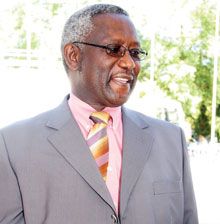IEC wants reforms
OLIVER MODISE
Staff Writer
| Thursday April 26, 2007 00:00


He singled out Section 25 of the Electoral Act for amendment to guard against voter transfers during by-elections. He said that the election date should be known well in advance and not left to the whims of the President. 'The election date should be known well in advance, taking into account of course the possibility that, in the case of a general election, the President has the prerogative to (and in some circumstances may be forced to) dissolve Parliament earlier than at the end of the five year period.
'It is also essential that the Electoral Act gives the IEC the power to determine cut-off dates for registration so that all the rolls can be published and certified before a writ of election is issued.'
Seeletso proposes that there must be automatic cut off dates and transfers. These must be the date on which a political vacancy occurs due to death, resignation or other means. In a series of envisaged reforms, the IEC proposes that it should be given power to postpone an election even on polling day. Seeletso told MPs that there was confusion in the interpretation of Section 50 and 66 of Botswana's Electoral Act. While Section 66(1) states that at the end of voting time, the presiding officer shall declare that no more persons shall be admitted in to the polling station, Section 50(3) states that the presiding officer may permit the taking of the poll to continue for a period not exceeding two hours.
'This appears to mean that contrary to how these provisions are interpreted, after the appointed closing time, no voter is permitted to enter the polling station and the taking of the poll can only be extended by two hours, after which even those voters inside the polling station are not permitted to vote,' he said.
He added that the IEC is of the view that the two sections must clearly reflect the interpretation of the law. He said the IEC supported the idea that everyone in the polling station must be allowed to vote even if the voting is to continue throughout the night. Seeletso said Section 81 and 98 must be reviewed so that it could help level the playing field by monitoring the use of resources by candidates and political parties. Section 81 limits elections' expenses of a candidate to P50,000 and Section 98 makes it an offence to exceed the limit. Seeletso stated that there is need to increase transparency as a way of minimising the risk of undue influence by donors. 'The current deficiencies need to be addressed and the system improved, in accordance with best practice,' said Seeletso.
